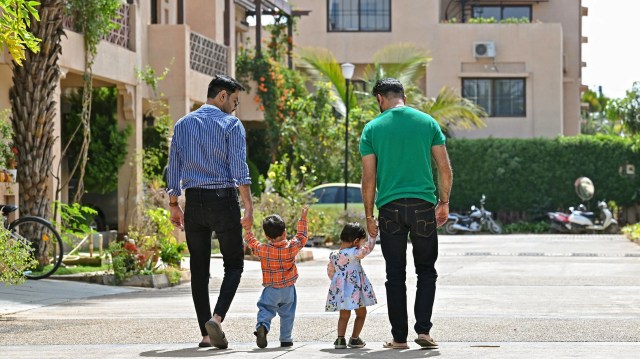
Attitudes about same-sex marriage vary widely around the world, according to a new Pew Research Center survey fielded in 24 countries. Among the surveyed countries, support for legal same-sex marriage is highest in Sweden, where 92% of adults favor it, and lowest in Nigeria, where only 2% back it.
This Pew Research Center analysis focuses on public opinion of the legality of same-sex marriage in 24 countries in North America, Europe, the Middle East, Latin America, Africa and the Asia-Pacific region. This is the first year since 2019 that the Global Attitudes Survey has included countries from Africa and Latin America, which were not included more recently due to the coronavirus outbreak.
For non-U.S. data, this analysis draws on nationally representative surveys of 27,285 adults conducted from Feb. 20 to May 22, 2023. All surveys were conducted over the phone with adults in Canada, France, Germany, Greece, Italy, Japan, the Netherlands, South Korea, Spain, Sweden and the United Kingdom. Surveys were conducted face-to-face in Hungary, Poland, India, Indonesia, Israel, Kenya, Nigeria, South Africa, Argentina, Brazil and Mexico. In Australia, we used a mixed-mode probability-based online panel.
In the United States, we surveyed 3,576 U.S. adults from March 20-26, 2023. Everyone who took part in this survey is a member of the Center’s American Trends Panel (ATP), an online survey panel that is recruited through national, random sampling of residential addresses. This way nearly all U.S. adults have a chance of selection. The survey is weighted to be representative of the U.S. adult population by gender, race, ethnicity, partisan affiliation, education and other categories. Read more about the ATP’s methodology.
Here are the questions used for the analysis, along with responses, and the survey methodology.
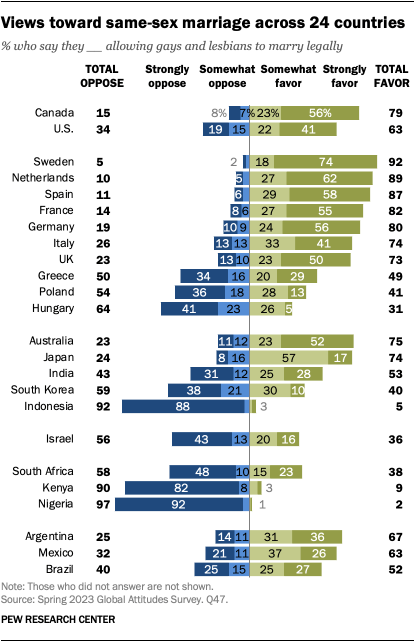
In the United States, where the Supreme Court legalized same-sex marriage nationally in 2015, 63% of adults support it and 34% oppose it. But views are highly fractured along political and demographic lines.
For example, Democrats and independents who lean toward the Democratic Party are nearly twice as likely as Republicans and Republican leaners to support same-sex marriage rights (82% vs. 44%). Similarly, nearly three-quarters (73%) of Americans under the age of 40 say they favor allowing gays and lesbians to marry legally – 16 percentage points higher than the share of Americans 40 and older who agree (57%).
Related: In places where same-sex marriages are legal, how many married same-sex couples are there?
Below is a closer look at how attitudes about same-sex marriage differ around the world, based on the new survey. The analysis looks at how attitudes vary by geography, demographic factors, political ideology and religion, as well as how views have changed over time.
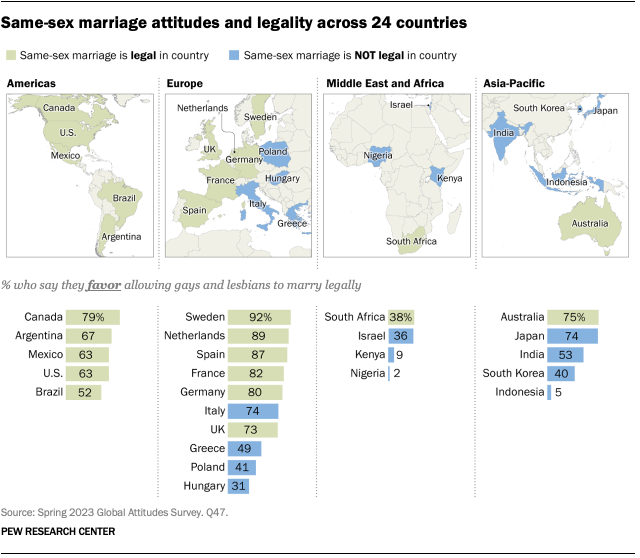
How attitudes about same-sex marriage vary geographically
Europe
People in Western Europe stand out as staunch supporters of same-sex marriage. At least eight-in-ten adults support it in Sweden (92%), the Netherlands (89%), Spain (87%), France (82%) and Germany (80%). In each of these countries, the practice is legal.
In Italy, where issues on LGBTQ+ rights are in the headlines, 74% of adults favor same-sex marriage rights, though it is not legal there.
Around three-quarters (73%) of adults in the United Kingdom also support same-sex marriage. The practice is legal in England, Wales, Scotland and Northern Ireland, although those laws were approved at various times over the last decade.
At the other end of the spectrum in Europe, just 41% of adults in Poland and 31% in Hungary support same-sex marriage. In both countries, same-sex marriage is not legal, and LGBTQ+ rights are a political and social flashpoint.
Americas
In North America, around eight-in-ten Canadians (79%) support same-sex marriage, as do 63% in both the U.S. and Mexico. Same-sex marriage is legal in all three countries.
Related: About six-in-ten Americans say legalization of same-sex marriage is good for society
In South America, 67% of Argentinians and 52% of Brazilians support the right of gay and lesbian people to marry. Both countries have also legalized the practice.
Asia-Pacific
Around three-quarters of adults in Australia and Japan favor legal same-sex marriage (75% and 74%, respectively). But while many Australians who favor same-sex marriage say they strongly support it (52%), support is weaker in Japan, where a 57% majority of adults somewhat favor legal same-sex marriage. Australia has legalized same-sex marriage, but Japan has not.
In India, 53% of adults say same-sex marriage should be legal, while 43% oppose it. The Indian Supreme Court is currently deciding a case on whether to legalize same-sex marriage.
In South Korea, same-sex marriage is not legal and the debate is making headlines. Among South Koreans, 40% favor legal same-sex marriage and 59% oppose it.
Indonesians are highly opposed to same-sex marriage legalization. Roughly nine-in-ten in Indonesia oppose allowing gays and lesbians to marry, including 88% who say they strongly oppose it. Just 5% of Indonesians support same-sex marriage.
Africa and Middle East
South Africa remains the only country in Africa where same-sex marriage is legal, having codified it in 2006. Nevertheless, 58% of South Africans oppose the practice.
Nigerians and Kenyans are the least supportive of same-sex marriage rights among the African countries surveyed. In Nigeria, where homosexuality is illegal, only 2% adults say they support the right of gays and lesbians to marry. And in Kenya, just 9% favor it.
In the Middle East, Israelis are also opposed to making same-sex marriage legal, with 56% opposed. Religious affiliation and political leanings heavily shape views on the issue of same-sex marriage rights in Israel.
How attitudes about same-sex marriage vary by demographic factors
Age
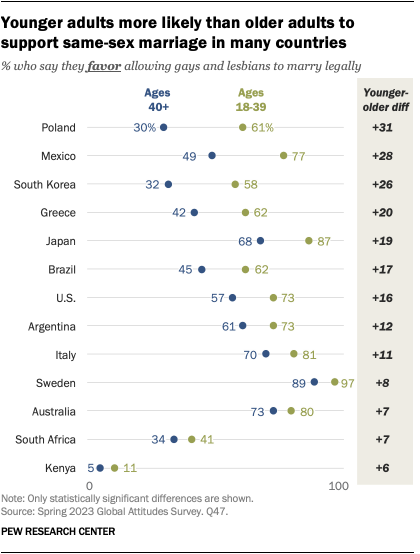
In 12 of the countries surveyed, adults under 40 are more likely than their older counterparts to say they favor allowing gays and lesbians to marry legally. In the other countries surveyed, there are not significant differences by age in support of same-sex marriage.
The age gap is greatest in Poland, where about six-in-ten of those under 40 express support for same-sex marriage, compared with three-in-ten among those 40 and older.
Gender
In 14 of the surveyed countries, women are more likely than men to say they support allowing gays and lesbians to marry legally.
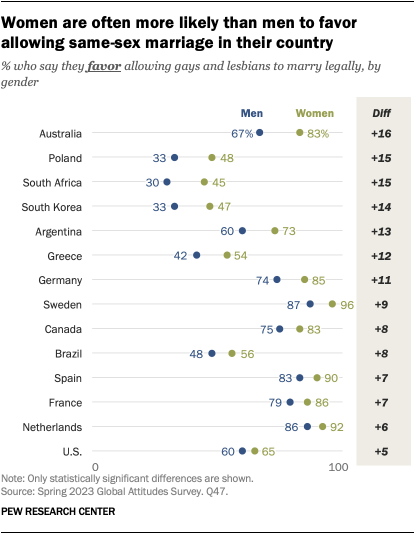
For example, in Australia, 83% of women favor it, compared with 67% of men.
There are similar gender differences in Poland, South Africa, South Korea, Argentina, Greece and Germany.
Education and income
In 17 of the surveyed countries, people with more formal education are more likely than those with less education to support allowing gays and lesbians to marry.
Similarly, in 13 of the countries, people with incomes over the national average are much more likely to support same-sex marriage than those with incomes below the country median.
How attitudes about same-sex marriage vary by political ideology
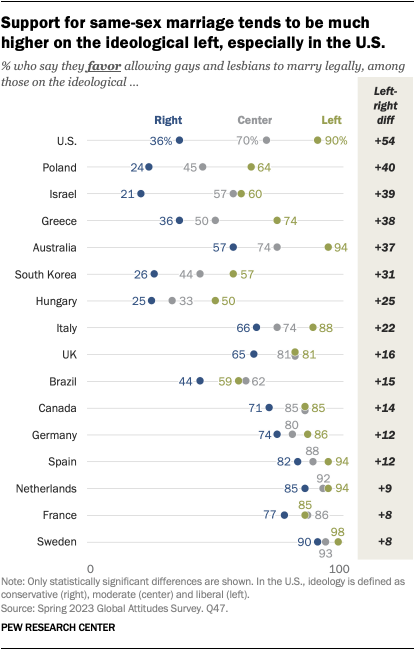
Views on same-sex marriage are related to political ideology in 16 of the 18 countries where the Center asked about respondents’ ideology this year. In these countries, those on the ideological left are significantly more likely than those on the right to favor allowing gays and lesbians to marry legally.
The ideological difference is greatest in the U.S., where liberals are 54 points more likely than conservatives to support same-sex marriage (90% vs. 36%). Still, in nine surveyed countries, majorities of those on both the right and left say they support same-sex marriage.
How attitudes about same-sex marriage vary by religion
Support for legal same-sex marriage tends to be lower in countries where more people say religion is somewhat or very important in their lives. Support is higher in countries where fewer people consider religion important.
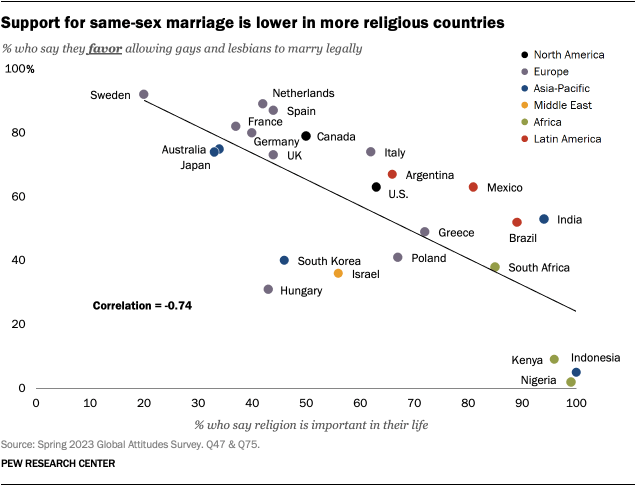
In Nigeria, 99% of adults say religion is at least somewhat important in their lives but only 2% favor legal same-sex marriage. In Sweden, by comparison, just 20% of adults consider religion important to them and 92% favor allowing gay and lesbian people to wed.
Similarly, people who are not affiliated with a religion are much more likely to say they support same-sex marriage. In Australia, for example, 89% of religiously unaffiliated adults say they favor same-sex marriage, compared with 64% of adults with a religious affiliation.
The survey shows some additional patterns by religion:
- Religiously unaffiliated Americans (85%) – especially atheists (96%) – are the most likely to favor same-sex marriage legality. White, non-Hispanic evangelical Protestants are the least likely religious group to say they favor it (30%). Around two-thirds of American Catholics (65%) favor same-sex marriage, as do 70% of White non-evangelical Protestants.
- In Brazil, Catholics (56%) are more likely than Protestants (32%) to support same-sex marriage.
- In Israel, Jewish adults (41%) are more likely than Muslims (8%) to support same-sex marriage. Among Israeli Jews, 4% of those who are Haredi (“ultra-Orthodox”) or Dati (“religious”) support legal same-sex marriage, compared with 29% of Masorti (“traditional”) Jews. Around three-quarters of Hiloni (“secular”) Jews support this policy.
- Christians and Muslims in Nigeria are equally likely to oppose same-sex marriage (97% and 98%, respectively).
How attitudes about same-sex marriage have changed over time
It is difficult to make direct comparisons between these new survey findings and past surveys on whether people favor or oppose same-sex marriage. Earlier Center surveys focused more on religion and its influence in society, rather than political attitudes and international affairs. And in some countries, the mode of the survey (e.g., face-to-face versus phone versus web) has changed over time.
However, a comparison with surveys conducted in Latin America in 2013-2014, in Europe in 2015-2017, and the long-term trend in the U.S. generally shows increased public support for the legalization of same-sex marriage over the last decade.
Note: Here are the questions used for the analysis, along with responses, and the survey methodology.







